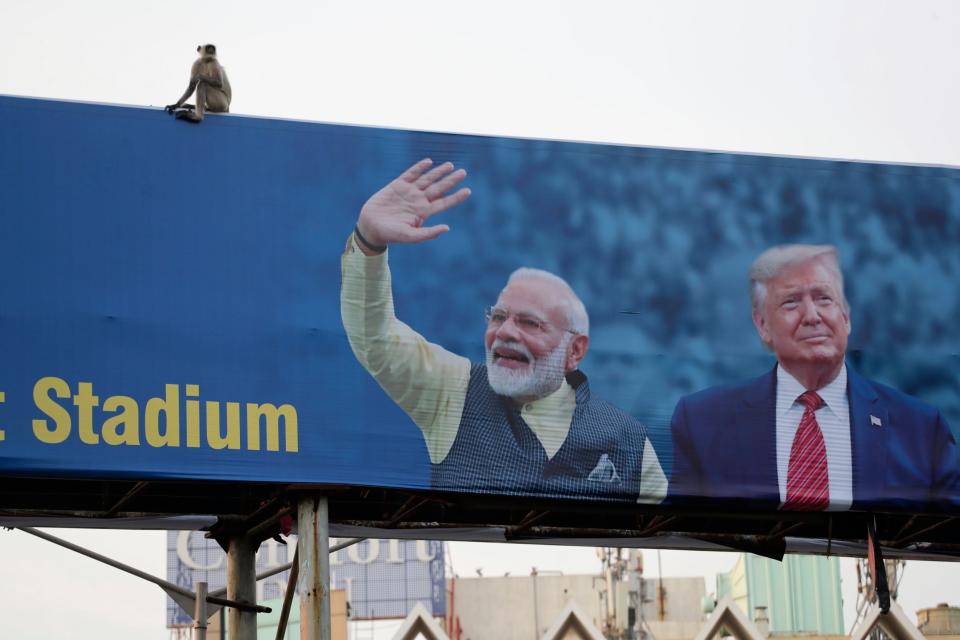US Congress panel criticises India’s 'punitive' new citizenship law days before Trump visit

A US congressional panel has issued a damning new report on India’s controversial citizenship law changes, warning of the potential “punitive consequences” for Muslims, on the eve of a major visit to the country by president Donald Trump.
The US Commission on International Religious Freedom (USCIRF) warned that the Citizenship Amendment Act (CAA), passed by Narendra Modi’s administration late last year, represented “a significant downward turn in religious freedom in India”.
The criticism was published in a rare standalone “factsheet” produced by the bipartisan panel, which is independent of the White House but advises the president and the State Department on foreign affairs.
Mr Trump and first lady Melania Trump will travel to India for the first time on Monday, and India is pulling out all the stops to give him a welcome of unprecedented pomp and scale. The president and Mr Modi have built a strong rapport since Mr Trump’s election in 2016, and the trip is intended to reciprocate the “Howdy Modi” stadium event put on in Texas last September.
Yet India is also in the midst of ongoing nationwide protests against the CAA and plans to extend a National Register of Citizens (NRC) nationwide. The CAA gives a route to citizenship for migrants of all major religions except Islam, while the NRC seeks to create a definitive list of Indian nationals.
Put together, the USCIRF warned, the CAA and NRC could “reserv[e] the label of illegal migrant for Muslims alone”, and “lead to the widespread disenfranchisement of Indian Muslims”.
The Indian government insists the CAA does not impact on the rights of any current citizens of India, and amid the popular backlash Mr Modi has contradicted senior ministers - and his ruling BJP party’s own 2019 election manifesto - to say there are no plans to roll out the NRC nationwide.
But the concerns expressed by the US panel follow similar comments from the UN secretary general Antonio Guterres, who said on Wednesday that CAA brought “a risk of statelessness” for India’s Muslim community.
USCIRF framed the citizenship changes as coming “in the context of the growing prominence of the BJP’s Hindutva ideology… [which] views India as a Hindu state and Islam as a foreign and invading religion”.
Ahead of Mr Trump’s visit, similar concerns were conveyed to the Indian government by US Congressmen Ami Bera and George Holding, who met with Modi’s foreign secretary Harsh Shringla on Wednesday.
Speaking to the media on Thursday, India’s foreign ministry spokesperson Raveesh Kumar said he expects there to be “an exchange of views” on matters affecting the South Asian region during talks between Mr Trump and Mr Modi in Delhi on Tuesday.
But it is trade, not human rights, that is expected to dominate proceedings. The US president has previously described India as the “tariff king of the world” and told reporters this week: “We're not treated very well by India, but I happen to like Prime Minister Modi a lot.”
Asked about that comment, Mr Kumar said it came “in the context of balance of trade”. “The US is India’s largest trading partner in goods and services,” he said. Pointing to a rise in Indian imports of US crude oil, and an expected multi-billion-dollar deal to buy American military helicopters, he added: “Efforts have been taken by India to address this particular concern… to bridge the trade deficit that exists at this point of time.”
Both sides have talked down the prospect of a significant trade deal being signed during Mr Trump’s visit, with long-standing trade differences between the two countries still to be resolved. The president was quoted as telling reporters outside Air Force One on Tuesday: “We can have a trade deal with India, but I’m really saving the big deal for later on.”
Mr Kumar said the talks were “complex negotiations… which could impact the lives of millions of people” and as such “we would not like to rush into a deal”. He said five less binding “memorandums of understanding” (MOUs) were being prepared on areas including intellectual property, trade facilitation and homeland security [cooperation].
As well as Delhi trade talks, Mr Trump’s visit will include a visit with Melania Trump to the world-famous Taj Mahal in Agra, and a stadium event in Ahmedabad, Gujarat - Mr Modi’s home state.
Mr Trump said he had been told seven million people will line the route from Ahmedabad airport to the new 110,000-capacity Modera cricket stadium, which will be inaugurated during the event.
The Indian foreign secretary has said “tens of thousands” will line the parade route as part of a “Road Show” with stages representing Indian states along the way. It is unclear why there is such a discrepancy in crowd numbers, although seven million is the estimated population of Ahmedabad as a whole.
Read more
Why India’s Muslims fear becoming ‘refugees in their own country’
Labour MP Abrahams denied entry to India and 'treated like criminal'
Trump says Modi promised ‘millions’ will greet him in India
Delhi’s election result sends a clear message to India’s ruling BJP
Why India’s liberal bubble is struggling under the rise of the right
Indian police bulldoze ‘immigrant’ homes, saying no time to check IDs
